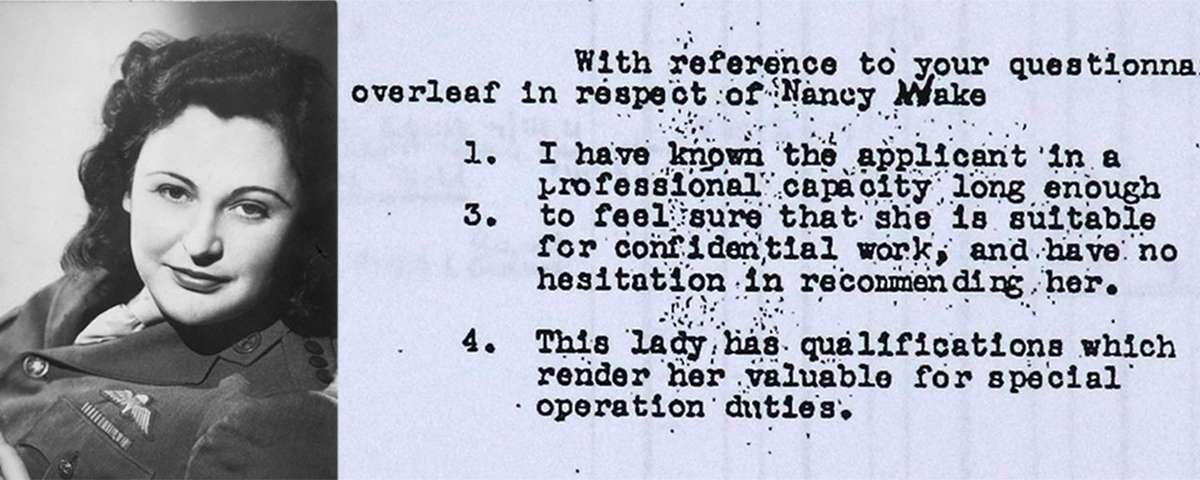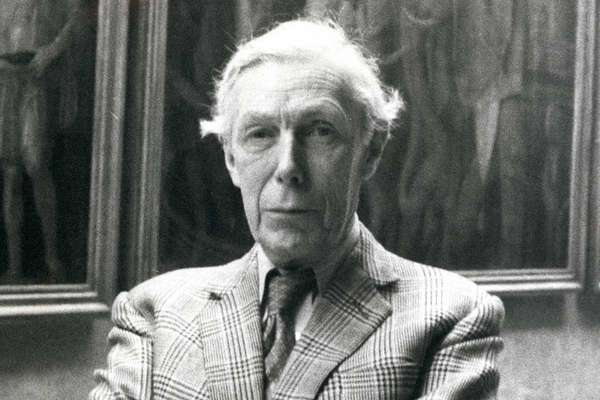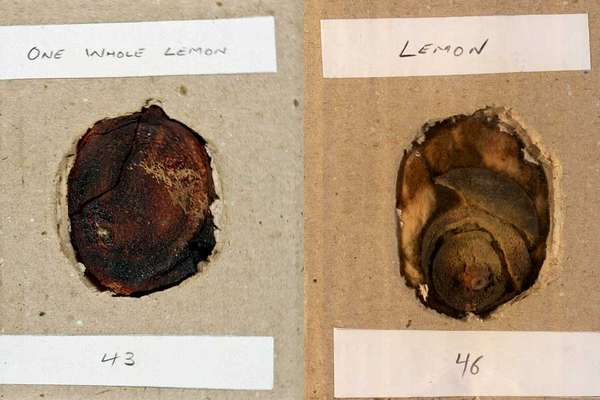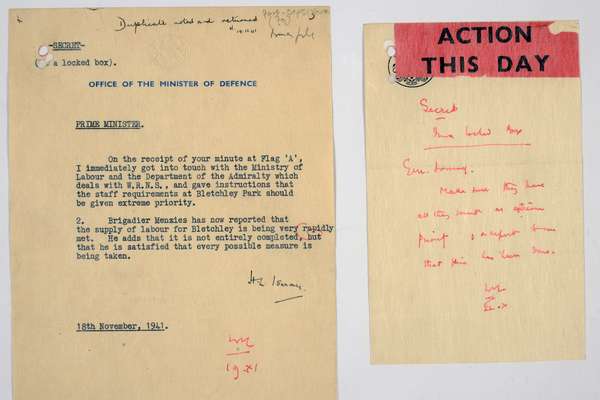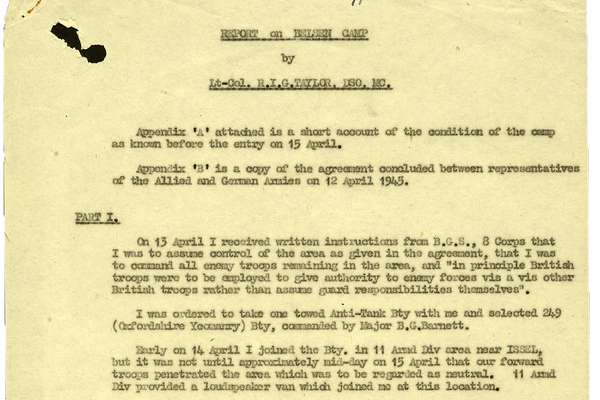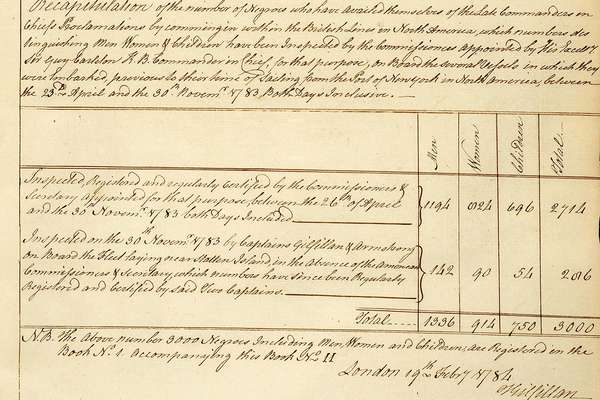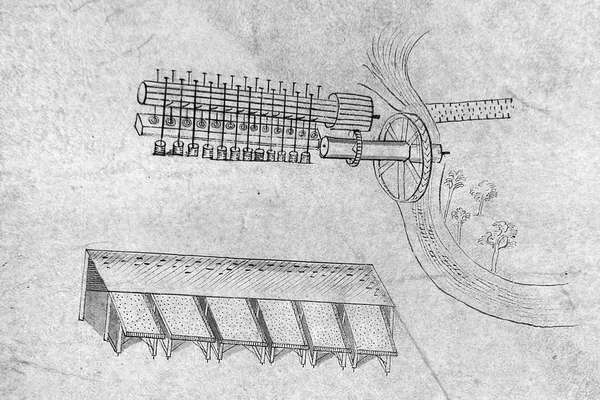Early life
Nancy Grace Augusta Wake was born in New Zealand in 1912 and raised in North Sydney in Australia. She was part-Maori through her great grandmother, Pourewa, of the Ngati Mahanga Iwi. At the age of 16 Nancy ran away from home and worked as a nurse. With £200 she inherited from an aunt she travelled to New York and then London where she trained as a journalist.
In the 1930s she worked for the Hearst newspaper empire as a journalist. While in Vienna she witnessed the brutal harassment of Jewish people by Nazi gangs in the streets and became aware of the threat of Nazism. In 1937 she met a wealthy French industrialist called Henri Fiocca and they married.
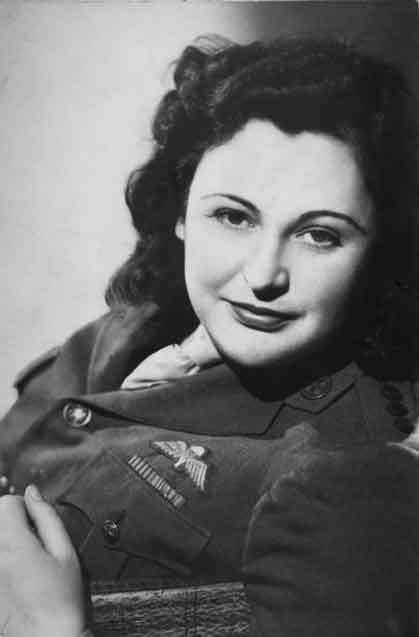
A studio portrait of Nancy Wake in 1945. Public Domain.
The Pat O'Leary line
When war came Nancy was living in Marseilles and worked as an ambulance driver. After the Franco-German armistice in 1940 which divided France, she worked for the escape line of Captain Ian Garrow. Upon the arrival of Lt Commander Albert Guerisse, RN, aka Lt Commander Pat O’ Leary, this became the Pat O’ Leary or 'Comete' line, helping refugees and Allied military personnel get out of France and back to England to re-join the war.
The Gestapo knew of Nancy and nick-named her the 'White Mouse' for her ability to escape from tight corners. They placed a reward of 5 million francs on her head. Eventually it became too dangerous for her to remain and continue this work. She left to travel to England via Spain. After she left, her husband Henri Fiocca was captured, tortured and killed by the Gestapo, a fact Nancy was unaware of until the end of the War.
Special Operations Executive
After being rejected for service with the Free French by Colonel Passy, Nancy was viewed with suspicion by the British Secret Intelligence Service because she had spoken to the Free French about joining them. A friend suggested that she contact the leader of the ‘F’ (French) Section of the Special Operations Executive (SOE), Maurice Buckmaster, about becoming a member of his group. Nancy was impressed by Buckmaster and joined the section.
Documents in The National Archives include what appears to be a reference from her Pat O’Leary line leader, Captain Ian Garrow, who also stuck up for her after she was found to be drunk one evening while on a training course.
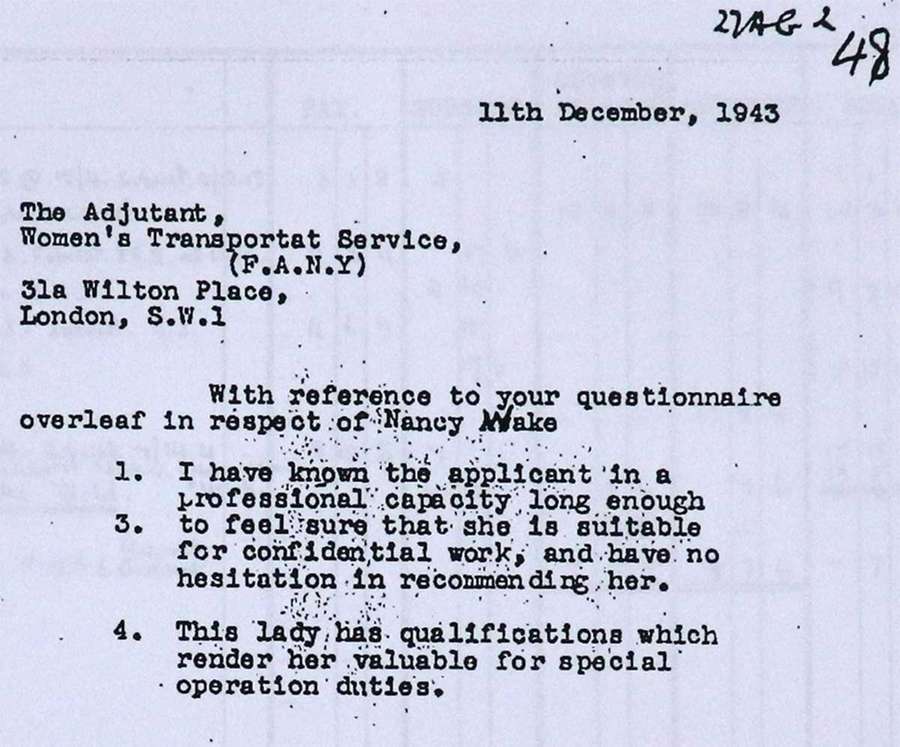
11 December, 1943
The Adjutant,
Women's Transport Service,
(F.A.N.Y)
31a Wilton Place,
London, S.W.1
With reference to your questionnaire overleaf in respect of Nancy Wake
I have known the applicant in a professional capacity long enough to feel sure that she is suitable for confidential work, and have no hesitation in recommending her.
This lady has qualifications which render her valuable for special operation duties.
A reference from Captain Ian Garrow. Catalogue reference: HS 9/1545.
Other documents demonstrate the vigilance paid by SOE to ensuring that potential agents would be up to undertaking clandestine work in the field in occupied territory.
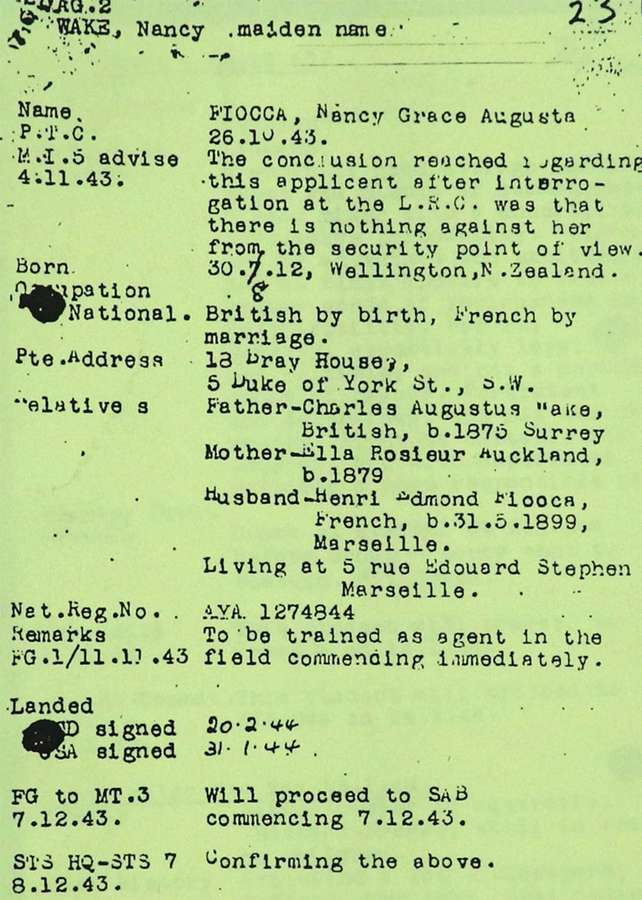
WAKE, Nancy maiden name
Name: FIOCCA, Nancy Grace Augusta
P.T.C. 26.10.43
M.I.5. advise 4.11.43: The conclusion reached regarding this applicant after interrogation at the L.R.C. was that there is nothing against her from the security point of view.
Born: 30.8.12, Wellington, N. Zealand.
National: British by birth, French by marriage.
Pte Address: 18 Bray House, 5 Duke of York St., S.W.
Relatives: Father – Charles Augustus Wake, British, b.1875 Surrey
Mother – Ella Rosieur Aukland, b.1879
Husband – Henri Edmond Fiocca, French, b.31.5.1899, Marseille.
Living at 5 rue Edouard Stephen Marseille.
Net.Reg.No. AYA 1274844
Remarks FG.1/11.11.43: To be trained as agent in the field commencing immediately.
Catalogue reference: HS 9/1545.
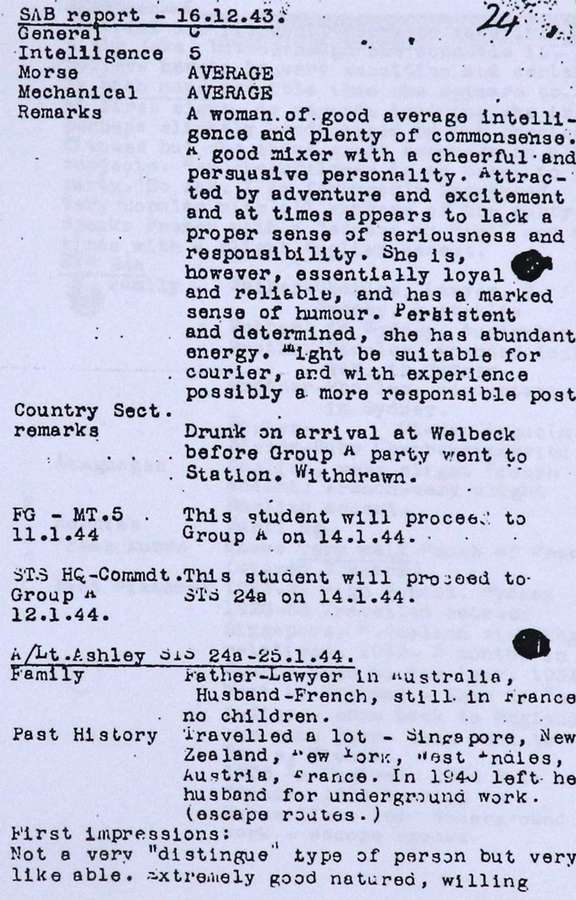
SAB report – 16.12.43
General: C
Intelligence: 5
Morse: AVERAGE
Mechanical: AVERAGE
Remarks: A woman of good average intelligence and plenty of common sense. A good mixer with a cheerful and persuasive personality. Attracted by adventure and excitement and at times appears to lack a proper sense of seriousness and responsibility. She is, however, essentially loyal and reliable, and has a marked sense of humour. Persistent and determined, she has abundant energy. Might be suitable for courier, and with experience possibly a more responsible post.
Count Sect. remarks: Drunk on arrival at Welback before Group A party went to Station. Withdrawn.
FG-MT.5 11.1.44: This student will proceed to Group A on 14.1.44.
STS HQ-Commdt. Group A 12.1.44: This student will proceed to STS 24a on 14.1.44
A/Lt. Ashley SIS 24a – 25.1.44.
Family: Father – Lawyer in Australia, Husband – French, still in France no children.
Past History: travelled a lot – Singapore, New Zealand, New York, West Indes, Austria, France. In 1940 left her husband for underground works. (escape routes.)
First impressions: Not a very “distingue” type of person but very likeable.
Catalogue reference: HS 9/1545.
The assessment of whether recruits were candidates were suitable to be sent into the field to act as agents and organisers was hard and gruelling as was the training. Reports went into detail and didn’t leave anything in doubt. Her training reports indicate that she was considered level-headed and a good shot.
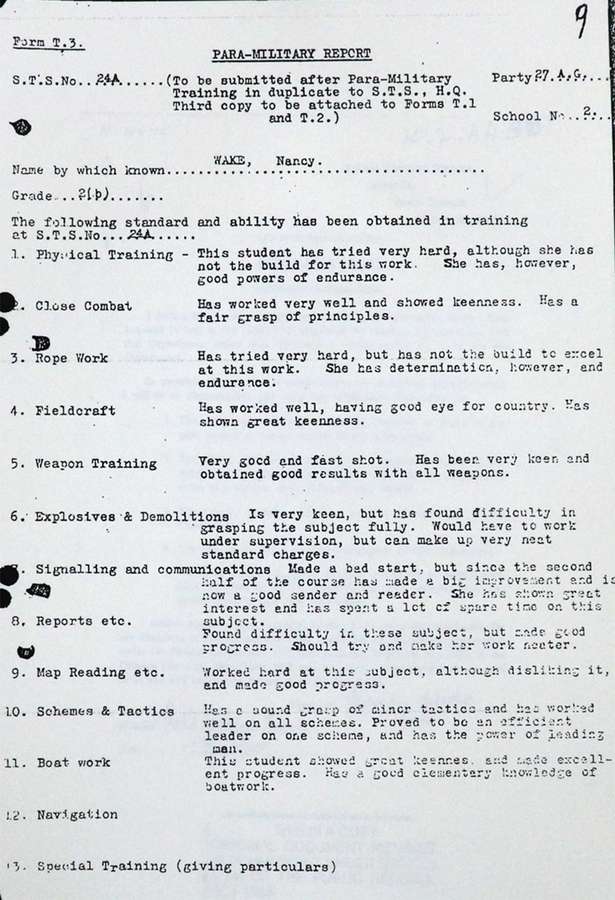
- Physical Training: This student has tried very hard, although she has not the build for this work. She has, however, good powers of endurance.
- Close Combat: Has worked very well and showed keenness. Has a fair grasp of principles.
- Rope Work: Has tried very hard, but has not the build to excel at this work. She has determination, however, and endurance.
- Fieldcraft: Has worked well, having good eye for country. Has shown great keenness.
- Weapon Training: Very good and fast shot. Has been vert keen and obtained good results with all weapons.
- Explosives & Demolitions: Is very keen, but has found difficulty in grasping the subject fully. Would have to work under supervision, but can make up very standard charges.
- Signalling and communications: Made a bad start, but since the second half of the course has made a big improvement and is now a good sender and reader. She has shown great interest and has spent a lot of spare time on this subject.
- Reports etc.: Found difficulty in these subject, but made good progress. Should try and make her work faster.
- Map Reading etc.: Worked hard at this subject, although disliking it, and made good progress.
- Schemes & Tactics: Has a sound grasp of minor tactics and has worked well on all schemes. Proved to be an efficient leader on one scheme, and has the power of leading man.
- Boat work: This student showed great keenness and made excellent progress. Has a good elementary knowledge of boatwork.
Nancy's paramilitary training report. Catalogue reference: HS 9/1545.
In the field
Nancy’s code name in the field was 'Hélène'. On 29–30 April 1944 as a member of a SOE team code-named Freelance, Nancy parachuted into the Allier department of occupied France. There she liaised between the SOE and various separate groups of Maquis (guerrilla resistance fighters) in the Auvergne region overseen by Emile Coulaudon aka 'Colonel Gaspard'.
In June 1944, Nancy participated in a battle between 500 Maquisards and a large German force of thousands including tanks, artillery and aircraft. The battle was a defeat for the Maquis. Nancy ordered that those immediately involved withdrew. She then cycled 500 kilometres to explain the situation to the various resistance groups she liaised with. She had to ensure that they too withdrew and dispersed to avoid engagement, casualties and capture pending further offensive actions.
The groups she led in the Auvergne caused the Germans more problems in terms of fire fights and sabotage than the Resistance in any other department of France. She managed this by strictly controlling and channelling supplies of arms and money to those groups actively. She was effectively involved in supporting the overall Allied strategy of D-Day and its aftermath.
Honours and awards
Nancy Wake was one of, if not the most, highly decorated woman on the Allied side in the Second World War. Following D-Day and the actions in the Auvergne she was promoted to Ensign. She would later be promoted to the ranks of Lieutenant and Captain.
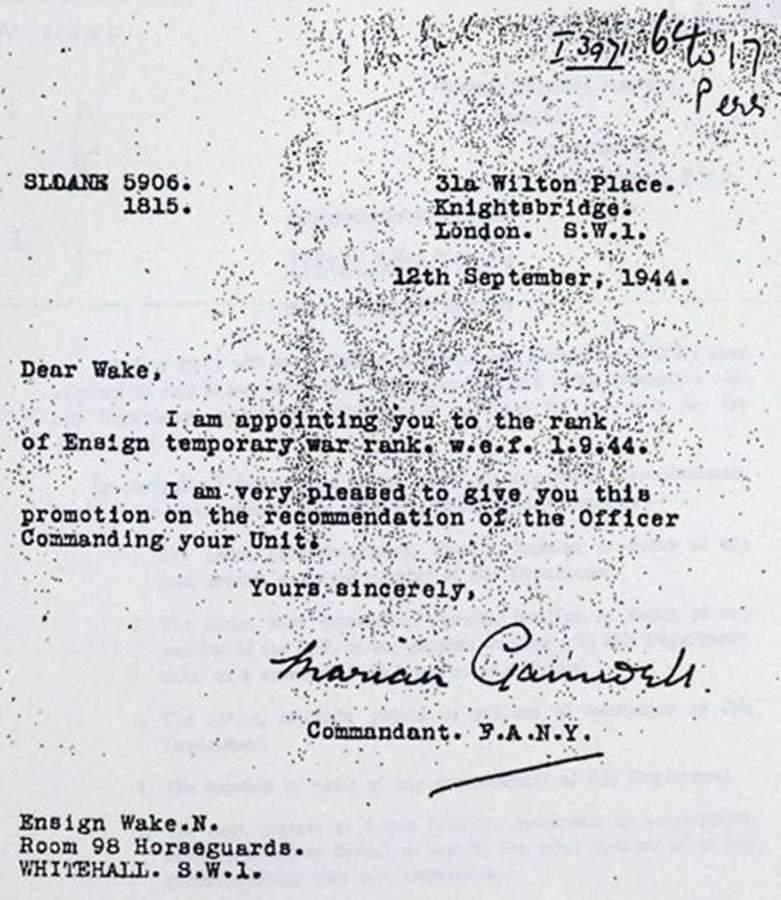
31a Wilton Place.
Knightsbridge.
London S.W.1.
12th September, 1944.
Dear Wake,
I am appointing you to the rank of Ensign temporary war rank. w.e.f. 1.9.44
I am very pleased to give you this promotion on the recommendation of the Officer Commanding your Unit.
Yours sincerely,
Marian Gamwell
Commandant. F.A.N.Y.
Ensign Wake.N.
Room 98 Horseguards.
WHITEHALL. S.W.1.
A 1944 letter from Marian Gamwell, commanding officer of the First Aid Nursing Yeomanry (FANY), notifying Nancy Wake of her promotion to Ensign. Catalogue reference: HS 9/1545.
She received the George Medal from the United Kingdom, the Medal of Freedom from the United States, the Légion d'Honneur (Knight and then Officer) the Croix de Guerre (3 times) and the Medaille de la Resistance from France, the Companion of the Order of Australia from Australia and the Badge in Gold from New Zealand. She was also eligible for various Campaign or Service medals.
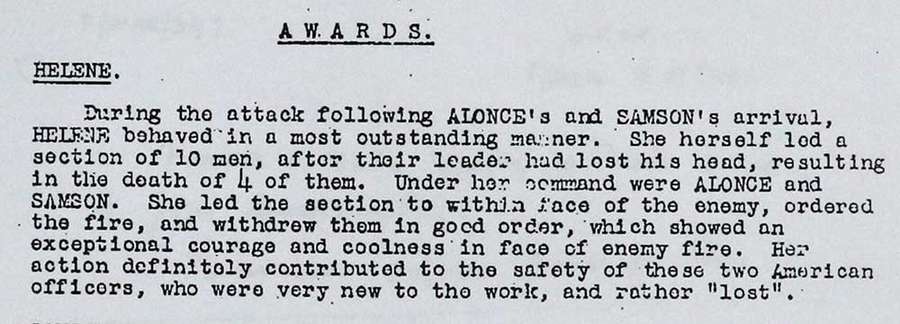
AWARDS
HELENE
During the attack following ALONCE's and SAMSON's arrival, HELENE behaved in a most outstanding manner. She herself led a section of 10 men, after their leader had lost his head, resulting in the death of 4 of them. Under her command were ALONCE and SAMSON. She led the section to within face of the enemy, ordered the fire, and withdrew them in good order, which showed an exceptional courage and coolness in face of enemy fire. Her action definitely contributed to the safety of these two American officers, who were very new to the work, and rather "lost".
Catalogue reference: HS 9/1545.
Later life
After the war she unsuccessfully stood as a Liberal candidate in the 1949 and 1951 Australian federal election for the Sydney seat of Barton. Both times she lost close ties to H. V. Evatt, who would later become the leader of the Australian Labor Party.
Nancy left Australia after the 1951 Election and returned to London. Here she went on to work for the British Air Ministry intelligence department at the Paris and Prague embassies resigning in 1957 following marriage to an RAF officer, John Forward. Together they returned to Sydney, retiring to Port Macquarie in 1969, further north in New South Wales.
In 1985 her autobiography The White Mouse was published. John died in 1997 and Nancy sold her medals to raise funds and returned to London, where she enjoyed regaling bar companions with war stories. She died on 7 August 2011, aged 98, at Kingston Hospital. She had declared that:
When I die, I want my ashes scattered over the hills where I fought with brave men.
Accordingly her ashes were scattered in the woods surrounding the Chateau de Fragne near Montlucon, which had served as Nancy’s HQ with the Maquis in 1944.
Records featured in this article
-
- From our collection
- HS 9/1545
- Title
- Nancy Wake's Special Operations Executive personnel file
- Date
- 1939–1946
Read more
Research Guide: Intelligence and security services
This guide will help you to find records held at The National Archives of, and relating to, the British intelligence and security services.
Blog: SOE and the art of blending in
This blog post looks at the methods used by Special Operations Executive agents to pass as members of the local population in Nazi-held territory.
